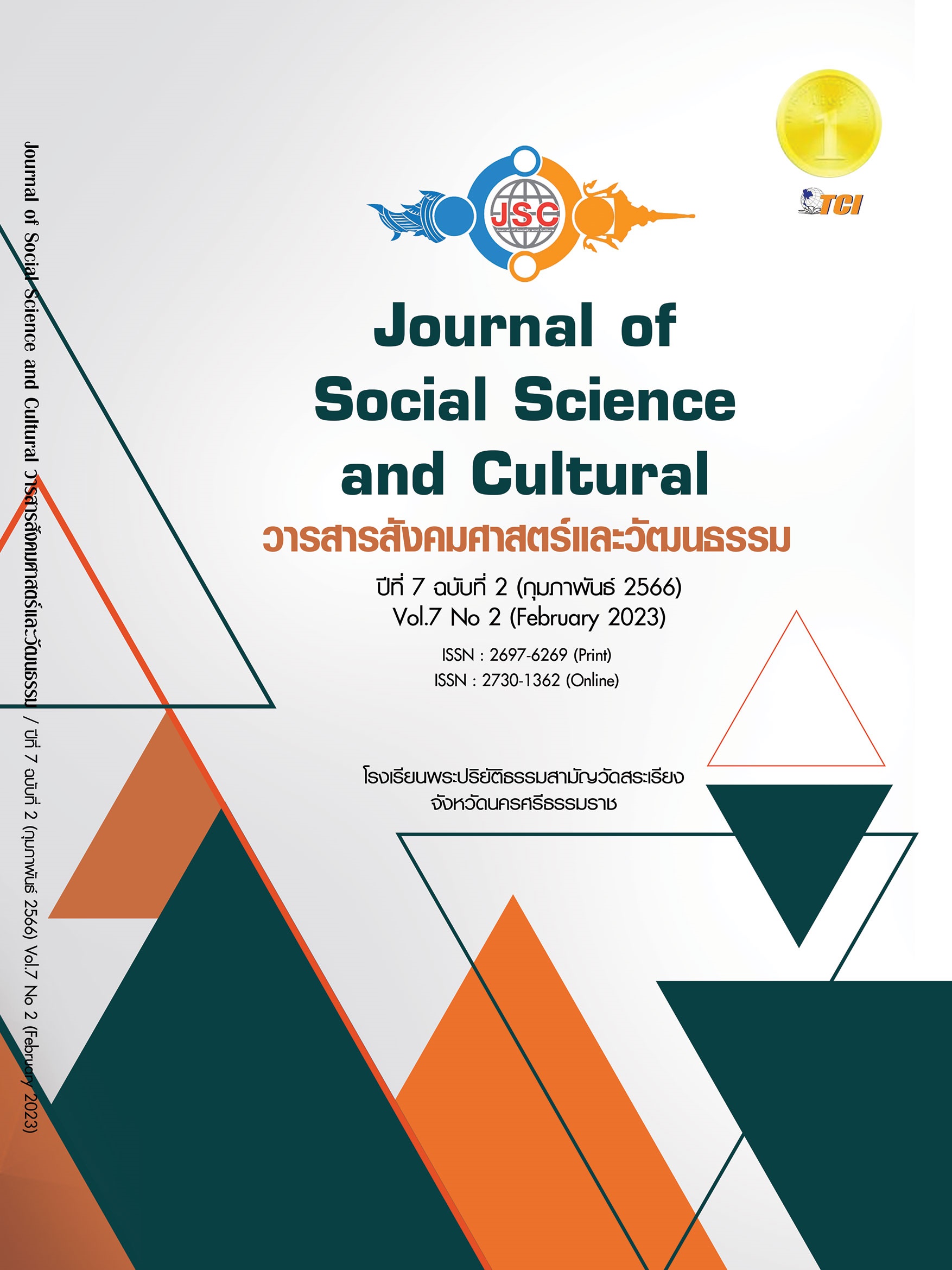MODEL FOR DEVELOPING POTENTIAL AND STRENGTH OF COMMUNITY ENTERPRISE ON PINEAPPLE PROCESSING GROUP AT WANG PONG SUBDISTRICT IN PRAN BURI DISTRICT IN PRACHUAP KHIRI KHAN PROVINCE
Main Article Content
Abstract
The objectives of this article were to: 1) study potential and strength of community enterprise on pineapple processing group, 2) develop products from pineapple of community enterprise on pineapple processing group, and 3) create model for developing potential and strength of community enterprise on pineapple processing group at Wang Pong Subdistrict in Pran Buri District in Prachuap Khiri Khan Province. The mixed research methodology was applied in this study. For quantitative study, the data were collected by using a questionnaire from 388 people planting pineapple in Wang Pong Subdistrict, selected by using purposive sampling method. The data were analyzed by using percentage, mean, standard deviation, and content analysis. For qualitative study, the data were collected by organizing focus group discussion with 15 persons consisting of community enterprise on pineapple processing group and using an interview form 9 persons consisting of operations sponsor of community enterprise. The research results were as follows: 1) The potential and strength of community enterprise on pineapple processing group were overall at a high level, 2) The development of products from pineapple of community enterprise on pineapple processing group of the members wanted “pineapple fiber honey soap” and “pineapple filled tarts”. The members of community enterprise on pineapple processing group could use pineapple processing as a main career or a supplementary career by adjusting their work processes to conform with social, political, cultural, and economic changes, and 3) The model for developing potential and strength of community enterprise on pineapple processing group was “CPLMN Model” consisting of C: Community Management, P: Participation Processes, L: Leadership, M: Management, and N: Network Cooperation. This format has been evaluated by experts with an average of 5.00, indicating that the format is appropriate, have a possibility, and can be utilized.
Article Details
References
กรมส่งเสริมการเกษตร. (2563). หมวดความหมายเกี่ยวกับรัฐวิสาหกิจชุมชนและเครือข่ายวิสาหกิจชุมชน. เรียกใช้เมื่อ 2 กุมภาพันธ์ 2565 จาก http://www.sceb.doae. go.th/ Ask&Answer(Update100449)/T5.pdf
โกวิทย์ พวงงาม. (2562). การจัดการตนเองของชุมชนและท้องถิ่น. (พิมพ์ครั้งที่ 2). กรุงเทพมหานคร: คณะสังคมศาสตร์ มหาวิทยาลัยธรรมศาสตร์.
จังหวัดประจวบคีรีขันธ์. (2563). รายงานผลการดำเนินงานประจำปี 2563 จังหวัดประจวบคีรีขันธ์. ประจวบคีรีขันธ์: กลุ่มงานยุทธศาสตร์และข้อมูลเพ่อการพัฒนาจังหวัด ศาลากลางจังหวัดประจวบคีรีขันธ์.
เจณิภา คงอิ่ม. (2561). การดำเนินงานของผู้ประกอบการวิสาหกิจชุมชนในจังหวัดนนทบุรี. วารสารมนุษยศาสตร์และสังคมศาสตร์ มหาวิทยาลัยราชพฤกษ์, 4(1), 156-170.
ชเนตตี พุ่มพฤกษ์ และนฤมล อนุสนธิ์พัทธ์. (2563). ศักยภาพและความเข้มแข็งของวิสาหกิจชุมชน ในจังหวัดพระนครศรีอยุธยา. วารสารวิทยาการจัดการปริทัศน์, 22(1), 133-144.
ธงพล พรหมสาขา ณ สกลนคร และอุทิศ สังข์รัตน์. (2556). แนวทางการพัฒนาการดำเนินงานของวิสาหกิจชุมชนในเขตลุ่มทะเลสาบสงขลา. สงขลา: สถาบันสันติศึกษา มหาวิทยาลัยสงขลานครินทร์.
ลักขณา อินทร์บึง และคณะ. (2564). การจัดการสู่ความเข้มแข็งของวิสาหกิจชุมชนในจังหวัดขอนแก่. วารสารสังคมศาสตร์และมานุษยวิทยาเชิงพุทธ, 6(3), 234-251.
วิภวานี เผือกบัวขาว และคณะ. (2564). ผลสัมฤทธิ์ของรูปแบบการสร้างเครือข่ายเพื่อความเข้มแข็งของของวิสาหกิจชุมชน กลุ่มแปรรูปผลิตภัณฑ์จากสับปะรดหมู่บ้านรวมไทย อำเภอกุยบุรี จังหวัดประจวบคีรีขันธ์. วารสารสังคมศาสตร์และมานุษยวิทยาเชิงพุทธ, 6(3), 178-193.
สนธยา พลศรี. (2556). การพัฒนาความสามารถของบุคคลและกลุ่ม. (พิมพ์ครั้งที่ 2). กรุงเทพมหานคร: โอเดียน สโตร์.
สมชาย เพชรเก่า และคณะ. (2561). การส่งเสริมศักยภาพด้านการจัดการของกลุ่มวิสาหกิจชุมชนแปรรูปสับปะรดบ้านห้วยหลวงพัฒนา ตามปรัชญาเศรษฐกิจพอเพียง. วารสารวิชาการอุตสาหกรรมศึกษา, 12(2), 126-138.
สำนักงานส่งเสริมวิสาหกิจขนาดกลางและขนาดย่อม. (2555). รายงานการศึกษาเครือข่ายวิสาหกิจอุตสาหกรรมผลิตภัณฑ์สับปะรด จังหวัดประจวบคีรีขันธ์. กรุงเทพมหานคร : สำนักงาน.
สุปราณี จันทร์ส่ง และคณะ. (2558). การพัฒนาทุนทางสังคมเพื่อสร้างชุมชนเข้มแข็ง. วารสารวิจัยและพัฒนา วไลยอลงกรณ์ ในพระบรมราชูปถัมภ์, 10(3), 273-283.
เสรี พงศ์พิศ. (2557). คู่มือการทำวิสาหกิจชุมชน. กรุงเทพมหานคร: เจริญวิทย์การพิมพ์.
องค์การบริหารส่วนตำบลวังก์พง. (2564). รายงานผลการปฏิบัติงานประจำปีงบประมาณ 2563. ประจวบคีรีขันธ์: องค์การบริหารส่วนตำบลวังก์พง.
Bloom, B. S. (1971). Hand Book on Formative and Summative Evaluation of Student Learning. New York: Graw-Hill Book Company.
Keeves, J. P. (1988). Educational Research, Methodology, and Measurement : An International Handbook. Oxford, England: Pergamon Press plc.
Steiner, E. (1988). Methodology of Theory Construction. Sydney: Ecology Research Associate.
Yamane, T. . (1973). Statistics: An Introductory Analysis, Third edition. New York : Harper and Row Publication.


